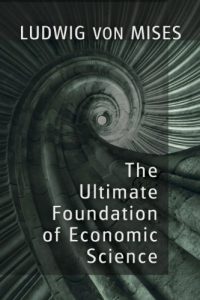If Mises has an unheralded masterpiece, The Ultimate Foundation of Economic Science is it. There are two senses in which this book is indeed ultimate: (1) it deals with the very core of economics as a science, and (2) it is the last book that he wrote.
If you have never read this book, you will be struck by the fiery and determined prose and the weightiness of the subject matter. When we set out to collect some of Mises's most pithy writing to put in The Quotable Mises, we found that this book was the most fruitful resource of all!
Also, the content reflects a lifetime of learning and Mises's desire to make one last impassioned statement to save both economics and liberty from sure destruction at the hands of intellectual error.
As his career was coming to a close, Mises saw that that fiercest battles over economic questions come down to issues of epistemology: how do we determine what is and what is not true in economics? How do we even know that economics is a valid science? What are the methods we should use in studying economics? What constitutes a true proposition and how do we know?
These questions matter because, as Mises says, the very future of freedom and of civilization itself depend on economic science, the development and application of which was "the most spectacular event of modern history."
Between Mises's earliest writings on this subject and this book, two movements had taken hold: "scientific" planning in public policy and positivism in the social sciences. Mises here battles both, first by showing how the two are related, and, second, by demolishing the basis of both. He shows that humans cannot be studied in the same way that we study the physical world. We are dealing with volitional beings whose choices make controlled experiments completely impossible.
Does that imply that a kind of chaos exists in economic theory, that we must throw up our hands and do nothing but observe that all is in flux? Not at all, says Mises. There is a logical structure of the human mind that manifests itself in economic reality through strict laws of cause and effect. To understand economics is to see these laws as universal and inviolable.
To search for Mises Institute titles, enter a keyword and LvMI (short for Ludwig von Mises Institute); e.g., Depression LvMI
If you have never read this book, you will be struck by the fiery and determined prose and the weightiness of the subject matter. When we set out to collect some of Mises's most pithy writing to put in The Quotable Mises, we found that this book was the most fruitful resource of all!
Also, the content reflects a lifetime of learning and Mises's desire to make one last impassioned statement to save both economics and liberty from sure destruction at the hands of intellectual error.
As his career was coming to a close, Mises saw that that fiercest battles over economic questions come down to issues of epistemology: how do we determine what is and what is not true in economics? How do we even know that economics is a valid science? What are the methods we should use in studying economics? What constitutes a true proposition and how do we know?
These questions matter because, as Mises says, the very future of freedom and of civilization itself depend on economic science, the development and application of which was "the most spectacular event of modern history."
Between Mises's earliest writings on this subject and this book, two movements had taken hold: "scientific" planning in public policy and positivism in the social sciences. Mises here battles both, first by showing how the two are related, and, second, by demolishing the basis of both. He shows that humans cannot be studied in the same way that we study the physical world. We are dealing with volitional beings whose choices make controlled experiments completely impossible.
Does that imply that a kind of chaos exists in economic theory, that we must throw up our hands and do nothing but observe that all is in flux? Not at all, says Mises. There is a logical structure of the human mind that manifests itself in economic reality through strict laws of cause and effect. To understand economics is to see these laws as universal and inviolable.
To search for Mises Institute titles, enter a keyword and LvMI (short for Ludwig von Mises Institute); e.g., Depression LvMI












